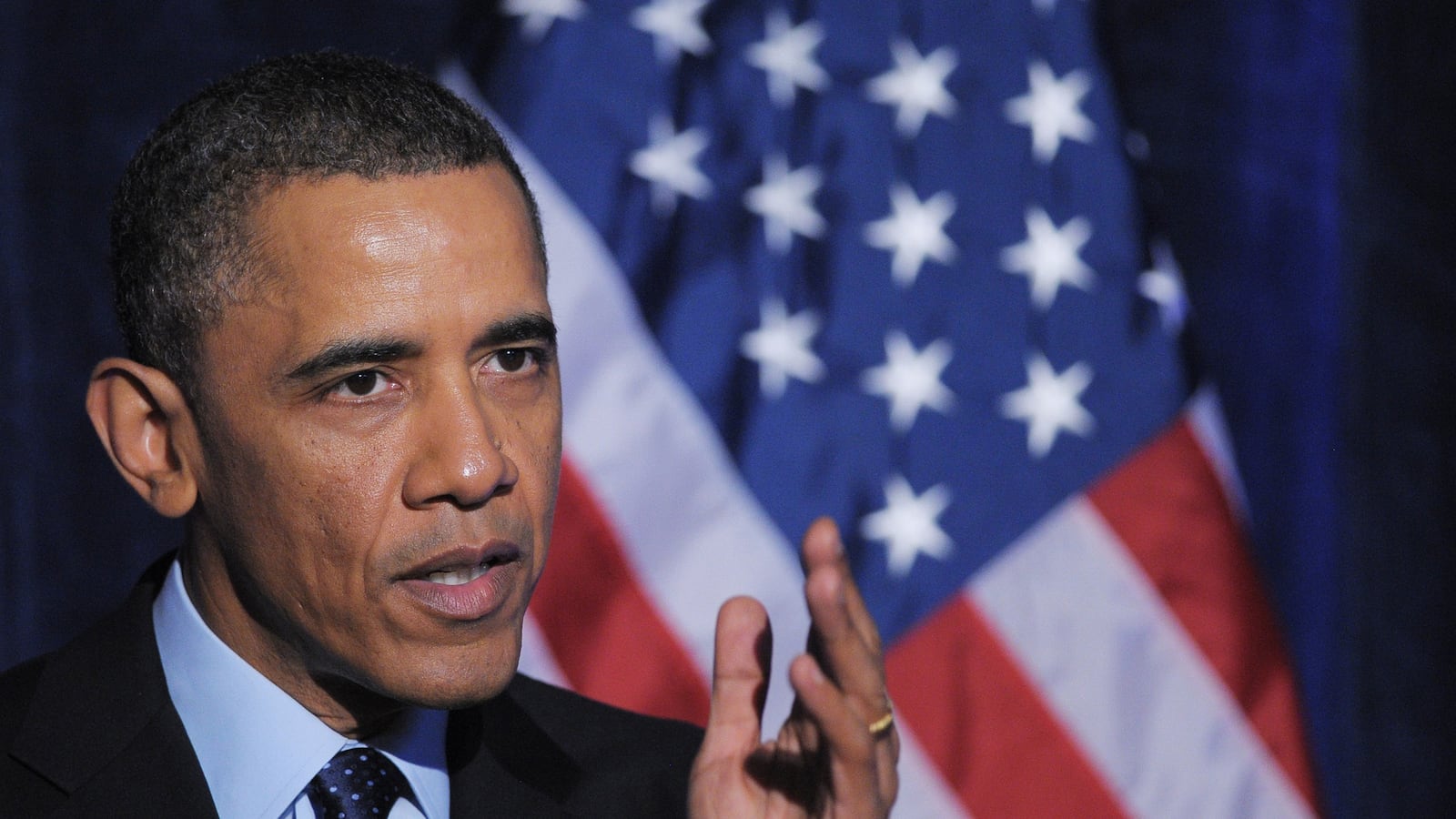As President Obama is discovering, election, or more particularly reelection, can be a waning mandate. Yes, he won his top rate tax increases in January—but less because Republicans accepted the verdict of last November than that they feared the blame in November 2014 if they conspicuously shattered the credit-worthiness and economic stability of the United States. And now we are at a point where Obama himself suggests that the differences are just "too wide" to achieve a "grand bargain" on America's fiscal future. The president says he won't yield if the GOP position is "we can only do revenue if we gut Medicare ... Social Security ... or education."

Well, although they wouldn't put it in those words, that is exactly the Republican position: voucherize Medicare, mow down Medicaid, and, no surprise, slash tax rates for the wealthy and corporations to 25 percent. From White House officials to Congressional Democrats to liberal commentators like Rachel Maddow, there has been a common reaction: doesn't Ryan know that he and Mitt were beaten, and pretty soundly? To reinforce her point—and Ryan's hypocrisy—Maddow went to the videotape of last summer, when Ryan promised, "[w]hoever wins this election is going to determine what all this"—from entitlements to tax policy—"looks like next year."
In reality, things don't work out that way—and they certainly aren't now. In fact, the Tea-fueled Republican resistance to Obama's approach is both consistent with history, and dangerously ahistorical.
First, the consistency: political parties don't surrender core positions just because their presidential nominee finished behind, sometimes far behind, in the electoral college.
After Richard Nixon carried 49 states in 1972, Democrats continued to press for a definitive end to the Vietnam War—and Congress ultimately defied the impeached and disgraced president's successor Gerald Ford and their mutual secretary of State, Henry Kissinger, by refusing a request for last-minute arms and air cover for the South Vietnamese regime. Senator Jacob Javits, a Republican but a long time doubter about the war, was blunt: Congress would "provide large sums for evacuation, but not one nickel for military aid." A conflict that never should've been fought was finally over.
The examples here are legion, for both Democratic and Republican presidents, and whether their elections were close calls or landslides. John F. Kennedy ran on Medicare in 1960—it was a central difference between him and Nixon—and then against fierce opposition, lost the bill in the Senate by four votes. In 1994, Bill Clinton's health-care reform, a hallmark promise of his campaign, never even reached the floor of either house of Congress. George W. Bush claimed a mandate after 2004, and then promptly saw Democrats decimate his proposal to privatize Social Security. After Hurricane Katrina, he couldn't pass a single major piece of legislation or stem the tide of hostility to the Iraq War—that became a driving force of the campaign of the young senator who would succeed him.
Ronald Reagan, another 49-state winner, did secure sweeping tax reform; but it was a Democratic as much as a Republican plan, embodying ideas Ted Kennedy had pursued for years and shaped as much by Democrats like Dick Gephardt and Bill Bradley as by his administration. Reagan achieved comprehensive immigration reform, but it had to be negotiated with Kennedy and others on both sides of the aisle. Beyond this, he yielded his past opposition to the Voting Rights Act, which was renewed in 1985. And Democrats, and a fair number of Republicans, stood their ground and overrode his shameful veto of sanctions on apartheid, a measure which isolated the racist regime in South Africa and played a crucial role in its downfall.
Lyndon Johnson, who was first elected to the Senate in 1948 by 87 votes, derisively earning the nickname "Landslide Lyndon," redeemed his electoral status by capturing the highest share of the popular vote in history in the presidential contest of 1964. But he's the exception that proves the rule. He promptly passed Medicare and the rest of his "Great Society"—but only because his party had two-thirds majorities in the Senate and the House— and for only two years. Republicans fought back; LBJ was increasingly beleaguered by civil unrest at home and a domestic uprising against escalation in Vietnam. He didn't even dare to run again in 1968.
So the resistance Obama faces today is not unusual, even if it is unusually bitter. What is fundamentally ahistorical is the GOP's utter unwillingness to compromise—and its willingness to threaten the underpinnings of both government and the economy. Even in the throes of the Watergate scandal, the two parties collaborated to keep the system whole, sound, and on track. Or think of 1997: after House Speaker Newt Gingrich had pioneered the apocalyptic tactic of shutting down the government, which brought a fierce political backlash, he worked with President Clinton to enact the measures that led to a balanced budget. It is perhaps Bill Clinton's greatest achievement—and hard as it is to say this, Gingrich's finest hour.
Newt had learned the lesson of the shutdown. And today’s House Republicans say that they have, too. They've just approved a bill to fund the government until the end of September. The prevailing assumption is that the Senate will remove some of the poison pills that are killing domestic programs—and the final product will actually make it to the president's desk.
A great country shouldn't be making fateful fiscal decisions month by month, but it's better than fiscal collapse. That doesn't obviate the prospect of a gradual, grinding economic slowdown. Aside from the human pain, inflicted not just on federal workers but on the poorest and most vulnerable, the sequester is likely to reduce economic growth by at least half a percentage point and trigger the loss of one million jobs.
In the customary dramaturgy of the Beltway, excessive attention has been paid to a sideshow orchestrated by the Washington Post's Bob Woodward —the discredited claim that the president "moved the goalposts" by insisting that revenue be part of an agreement to avert sequestration. But in 2011, the White House made clear that any solution had to include "revenue—raising tax reform."
What matters far more than this tempest in the media's self-reflective mirror is the Republicans' manic and politically convenient obsession with growth-retarding, job-ravaging austerity. Throughout Obama's first term, they blocked effort after effort to help strained state and local governments and to lift demand across the economy. The result, as Paul Krugman wrote, was an unemployment rate 1.5 percentage points higher than it otherwise would have been by March 2012. It was bad economics by Republicans—and as it turned out, bad politics too, as Obama reframed the election not as a referendum on the sluggish state of the recovery, but as a choice defined by a question to which Romney could never be the answer: Who stands up for the middle class? Who's on your side?
Now the GOP, impelled by ideology matched to calculation, is trying the same game again. And Republicans aren't deterred, but encouraged by the near-universal consensus—and the nearly universal proof from Europe to Asia and the Americas—that austerity is the road to economic malaise or recession. The obvious aim is to blame Obama and the Democrats and rerun the 2010 elections in 2014.

I've argued here before that the president in effect has to run for a third term in the midterm campaign. Aside from marshaling the unparalleled competencies of his organization—and I don't care about the tut-tutting of goo-goo groups like Common Cause about his fundraising for this—unilateral disarmament is not a sufficient response to the Koch brothers and their ilk—the president has to pin the tail on the elephant. As the sequester erodes the recovery, he has to hold the GOP accountable, and he has to draw dividing lines on the budget and fiscal policy: growth now, deficit reduction over time; Social Security, Medicare, investment in the future, not tax windfalls for the wealthy.
On a broad span of issues, from economic justice to the rights of women, Hispanics, other minorities, and gays and lesbians, the GOP is paddling against the tide of history. They will do it less conspicuously now, as quietly as the base will let them. And in the meantime, in the name of a clichéd and miscarried fiscal discipline, they will block or weaken the recovery every step of the way—and hope no one notices. Obama can and must make sure everyone does.
The president has reached out, sought out middle ground, and repeatedly been rebuffed. His experience validates JFK's observation that you can't negotiate with those who say: "What's mine is mine and what's yours is negotiable." For the sake of the nation, I wish Obama had some of the luck of Clinton in 1997. So while I never thought I'd write this either, maybe we should bring back Newt Gingrich.






